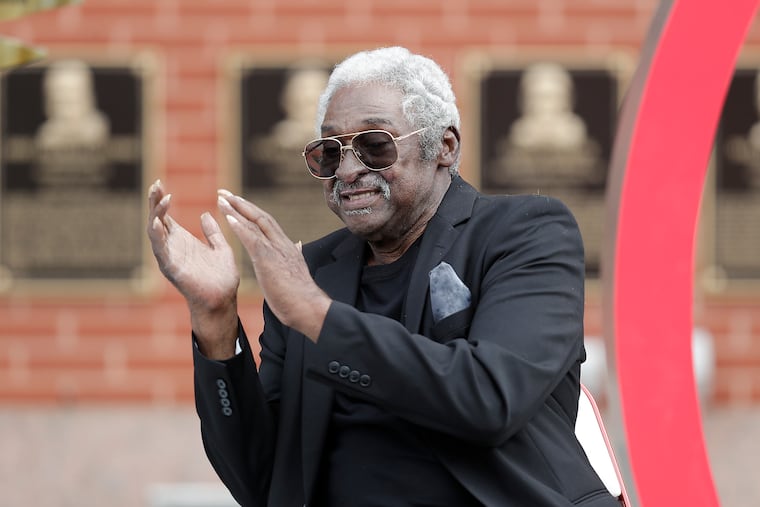Phillies great Dick Allen has another chance to be voted into the Baseball Hall of Fame
Will this finally be the time Allen, who died in 2020, gets called to Cooperstown?

Dick Allen’s 42-ounce bat will take another swing at the Hall of Fame as the late Phillies slugger is again under consideration for induction.
Allen, who died in 2020, was one of eight players named Monday to the Hall’s Classic Baseball Era Committee ballot. For induction, a candidate must receive 75% of the votes from the eight-person committee. The panel will meet on Dec. 8 at baseball’s winter meetings in Dallas.
Allen fell one vote shy on similar committees in 2014 and 2021. The Hall said the candidates on the Classic Baseball Era were those “whose primary contribution to the game came prior to 1980.” Joining Allen are Ken Boyer, John Donaldson, Steve Garvey, Vic Harris, Tommy John, Dave Parker, and Luis Tiant.
Boyer, an 11-time All-Star, topped the Phillies’ Johnny Callison for the 1964 National League MVP Award with the world champion Cardinals. Donaldson was a premier Negro League pitcher who helped establish the barnstorming business model. Garvey won four Gold Gloves and was the 1974 National League MVP with the Dodgers and was the MVP of the 1978 and 1984 NLCS. Harris played 18 seasons in the Negro Leagues and won seven Negro National League pennants and the 1948 World Series with the Homestead Grays. John was a four-time All-Star and ranks eighth all-time among pitchers with 700 career starts. Parker was the 1978 NL MVP with Pittsburgh, won three Gold Gloves, and hit 339 homers over 19 seasons. Tiant had four 20-win seasons and won two ERA titles in the American League.
Allen grew up in Western Pennsylvania and was the National League’s Rookie of the Year for the star-crossed 1964 Phillies. He hit 204 of his 351 homers with the Phillies, some of which famously cleared the Coca-Cola sign at Connie Mack Stadium.
He was one of the premier hitters of his generation as his 165 OPS+ from 1964 to 1973 led the majors, better than such all-time greats as Hank Aaron, Harmon Killebrew, and Willie McCovey. Allen’s 155 weighted runs created plus, a statistical measure of his offensive production, was 55% better than league average, ranks 18th all-time, and is just below that of Mel Ott and just above Willie Mays.
He won the American League MVP in 1972 with the White Sox, and was a seven-time All-Star. But his Hall of Fame case fell flat in 1983 — his first year of eligibility — when just 3.7% of the writers voted for him. Allen was on the ballot for 14 years and never received close to the 75% needed for enshrinement.
» READ MORE: The story of Dick Allen, Philly's misunderstood superstar
Allen did not get along with some baseball writers during his career and his case for Cooperstown was often hurt by claims that he was a distraction to his teams. There was the time he suffered a hand injury when pushing his car, the twi-night doubleheader he missed after spending time at the horse track, the batting-cage fight with teammate Frank Thomas, and the time he threatened to skip the postseason if the Phillies didn’t add Tony Taylor to the roster.
But what Allen overcame — a minor-league season of racial taunts in Arkansas, followed by being one of the first African American Phillies during the racially charged 1960s, and playing the field with a batting helmet for protection from projectiles — could have been valued just as much by the writers.
Allen wrote his request to be traded in the infield dirt near the end of the 1969 season — he played for St. Louis in 1970, the Los Angeles Dodgers in 1971, and the Chicago White Sox from 1972-74 — but returned to Philadelphia in 1975, just as the core of the 1980 championship team was coming together. Mike Schmidt credits Allen for helping him relax; Larry Bowa said Allen pushed the young players in the right direction; and Larry Christenson called him a quiet leader. Allen finished his career with Oakland in 1977.
“He always built me up,” said Garry Maddox. “You play with certain players who even though they’re stars, they can still lift you up. Pete Rose was the same way. Pete Rose knew all of his statistics, but he knew when you needed a pep talk. Dick was always there for me.
“When someone like Dick Allen wants to talk to you or thinks you’re worth his time, that in itself is huge. He was one of the most influential people in my growth. Not necessarily as a ballplayer, but as a person.”
Allen soured on the Hall of Fame after years of being left out. He was inducted into the Negro Leagues Hall of Fame in 2018 and considered it the ultimate honor. The Phillies retired Allen’s No. 15 in September 2020, three months before he died. That was enough, he said. But his son, Richard, said three years ago that his father still would have appreciated a bronze plaque in Cooperstown, N.Y. He’ll get another chance next month.
» READ MORE: Dick Allen’s son says his father is laughing at latest Hall of Fame snub